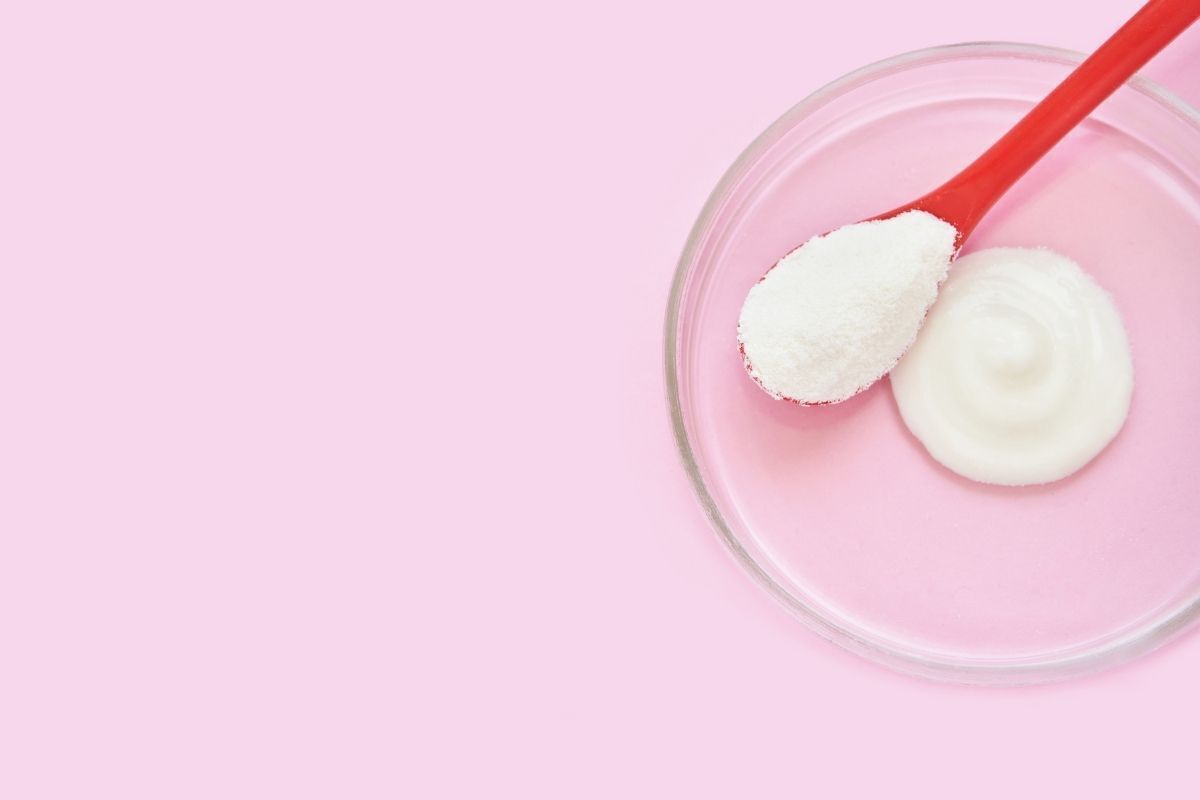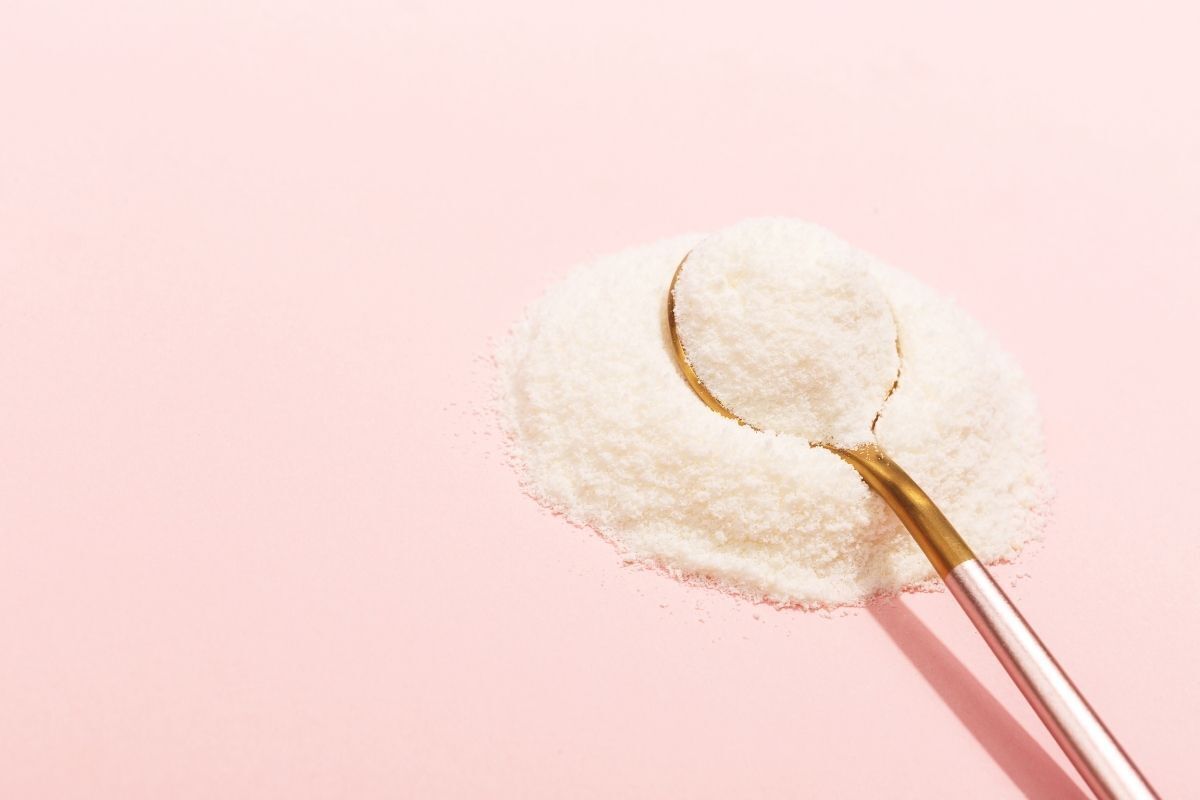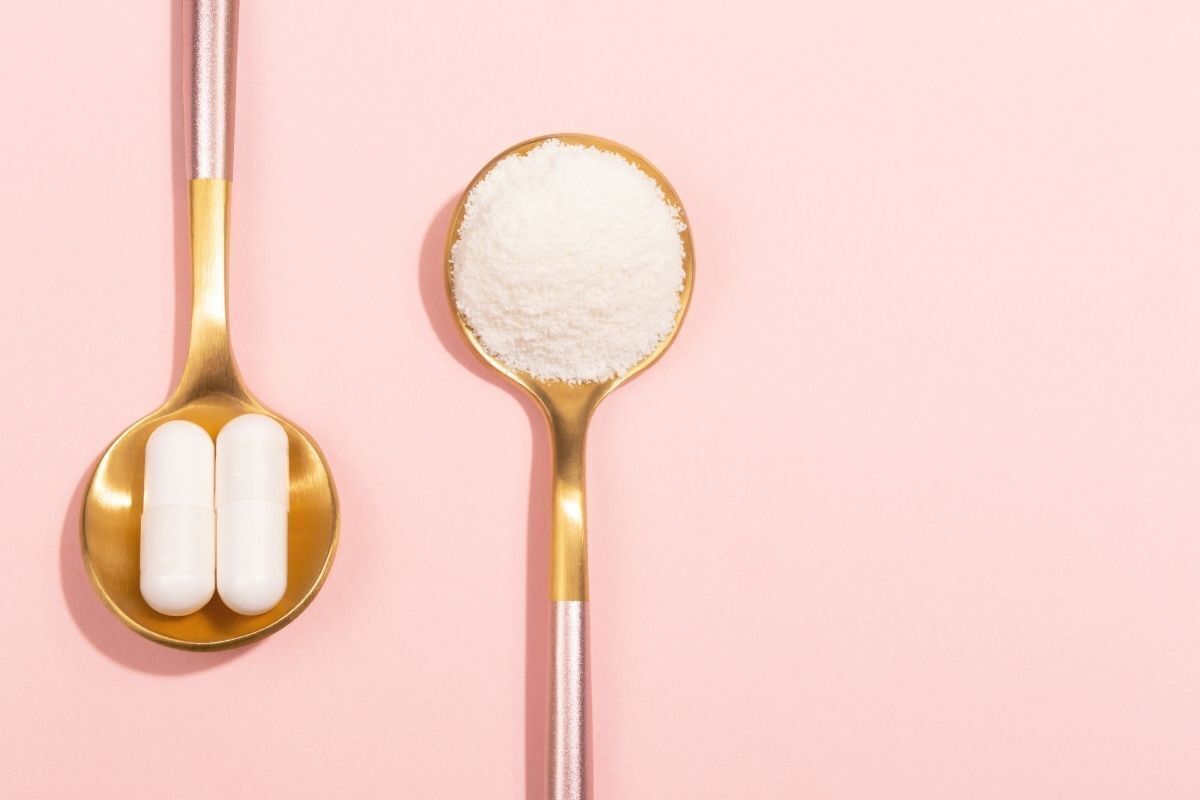Table of contents
Do you know the benefits of collagen?

Collagen is a protein naturally produced by the human body. Its functions are to ensure elasticity and firmness to the skin, so collagen is important to prevent the appearance of expression lines, wrinkles, and stretch marks.
In addition to being produced by the body, collagen can also be found in some foods, such as gelatin and meat, in cosmetic products, such as moisturizing creams, and can be supplemented in capsules.
After a certain age, collagen production goes through a decline, so it is important to know more about its importance, the ways it can be replaced, and its benefits to the body, to make sure that this protein is not in short supply. Learn more about it below!
Understanding more about collagen

Collagen has many functions in the body due to its fibers, which act like glue and help various different tissues. There are four main types of this protein, and each one helps in a different aspect, so it is important to get this information before you replace it. See more in the next section of the article!
What is collagen?
Collagen is a protein naturally produced by the human body. In terms of structure, it can be described as three-dimensional and formed by multiple helices, all composed of sequences of three amino acids.
In order for collagen to be synthesized naturally by the body, other nutrients must be present in the body, such as vitamin A, vitamin C, copper, and zinc. It is possible to state that collagen has fibers that act as a kind of glue, ensuring that the tissues of the human body have cohesion.
What is collagen used for?
Collagen offers elasticity, resistance, flexibility, and hydration to the body's tissues. Its family represents, on average, 35% of the total proteins present in the human body and has a distinct action in each of the tissues it acts on.
When it comes to the skin, it is possible to state that proteins of this type make up 85% of its composition and help maintain elasticity, hydration, and resistance, ensuring a youthful appearance. On the other hand, in the joints and other tissues, collagen is responsible for ensuring the adhesion of the structures.
Properties of collagen
Quickly absorbed and found naturally in the body, collagen ensures skin resistance, in addition to ensuring healthier nails and hair. Because it is present in the body's support tissue fibers, it is also beneficial for joints, tendons, and muscles.
Furthermore, it is possible to point out that the presence of collagen in the joints of the bones ensures that they do not bump into each other, which would cause people wear and pain. Therefore, it is a fundamental protein for the functioning of the human body.
Types of collagen
There are several different types of collagen, and each one of them has a function in the body, so that they act in different areas. It is estimated that this protein has 28 variations. However, four of them are the most talked about and the most present in the human organism.
Type I is concentrated in the skin, type II is present in cartilage, type III is found in the muscles of the intestine and uterus, as well as in arteries and some vital organs, and type IV is made up of molecules that associate with fibrils to form a membrane that acts as a filter.
Collagen Type I
Type I collagen, also known as hydrolyzed collagen, is extracted from the bones and cartilage of animals. It is the most common collagen in the human body because of its properties, as well as its absorption capacity. Among its functions is to improve skin firmness.
This type of protein is found in the form of thick fibers, so it is the most resistant to stress of its main types, and can therefore also be found in structures such as tendons and bones, which are responsible for supporting the human body. Type I collagen is also present in teeth.
Collagen Type II
Known as undenatured collagen, type II collagen is one of the main components of cartilage. It is manufactured using a different process than type I collagen, and consumption of the protein is indicated when autoimmune joint diseases arise in the body.
In addition, it can also be used on occasions when cartilage has been damaged. This type of protein works like a sponge and binds to water molecules, thus giving the knee, for example, the ability to support the weight of the human body.
Collagen Type III
Type III collagen is found in loose connective tissue and smooth muscle tissues. It is responsible for forming the reticular fibers of the human body and can also be found in the aorta of the heart and in internal organs such as the liver, uterus, and lungs.
When talking about its forms of consumption, it is worth pointing out that it can be found in both hydrolyzed and natural versions. It is indicated for aesthetic benefits and also for maintaining the health of the indicated areas, especially in the case of people whose collagen production has already gone through a decline.
Collagen Type IV
Located in the kidneys, in the lens of the lens capsule, and in the glomeruli, among other places, type IV collagen has as its main characteristic the fact that it does not associate with small fibers. Its function is that of support and filtration.
This type of association ensures that they will promote health to all the cells in the human body.
What causes the loss of collagen?
The loss of collagen is something that happens naturally and as age advances. However, there are some habits that can contribute to an acceleration. Thus, restrictive diets or low protein intake can be cited as some of the causes for collagen loss.
Other aspects that contribute to the process being accelerated are excessive sugar consumption and constant exposure to the sun, especially without adequate protection. The signs are first noticeable in the hair, which becomes thinner. Later, the skin becomes more flaccid and loses elasticity.
Benefits of Collagen

The popularity of collagen is due to its many health benefits, so it is very important to find ways to replace it and to stop the loss process, ensuring that this substance, so important for health maintenance and for aesthetic purposes, is always present in the body. Want to know more about it?
Improves skin health
According to data from the Brazilian Society of Dermatology, it is common for natural collagen production to fall after the age of 25.
It is worth mentioning that collagen represents about 70% of all skin and maintains its firmness and elasticity. Therefore, it is a great ally of cosmetic treatments due to these properties. It is important to remember that factors such as excessive sun exposure can accelerate the loss and make expression lines and wrinkles appear more quickly.
Improves hair and nail health
When it comes to the nails, collagen acts to strengthen them, by promoting greater strength and thickness to these structures, ensuring that they will not break easily. This strengthening capacity of the protein can also be seen when talking about the hair.
Another aspect that collagen helps a lot in the hair is the shine, especially in its hydrolyzed form.
Acts in the treatment of osteoarthritis
Osteoarthritis is a disease that causes cartilage to wear away and causes bones to become unprotected by decreasing collagen presence. Since the protein is located at the ends of the bones, preventing them from leaning against each other, once the cartilage is compromised, this impact happens and generates pain.
Therefore, the consumption of protein, whether through food or supplementation, is indicated for people suffering from the disease. Once the insufficiency is noticed in the body, it is necessary to consult a doctor to determine the most appropriate form.
Strengthens bones
Collagen helps strengthen bones, preventing impact and damage, and is therefore very important for maintaining the human body's ability to move. In addition, the protein helps fight osteoporosis, a disease that makes bones more brittle.
Thus, it is worth noting that the consumption of collagen for the maintenance of bone health is indicated for people over 35 years of age. This can be done through food or supplementation, depending on the body's needs and existing health conditions.
Improves cardiovascular health
Collagen can be found in the structure of the arteries. It also acts to improve cardiovascular health by ensuring that the vessels become more elastic, making it easier to transport blood to the heart and to the rest of the human body.
Therefore, when the amounts of collagen in the body are insufficient, the arteries tend to become fragile, and the risk of diseases such as atherosclerosis is increased. Therefore, there are studies indicating that supplementation of this protein helps in the prevention of the aforementioned conditions.
Increases muscle mass
The increase in muscle mass and strength is directly associated with the production of collagen, so the levels of this protein need to be within the expected range for workouts focused on gaining muscle mass to be effective.
This happens because the protein helps to promote the synthesis of others that act directly on the muscles, as is the case of creatine. Furthermore, when talking about professional athletes, it is interesting to point out that collagen can be very interesting to guarantee a better performance.
Improves intestinal health
The intercellular junctions are essential for digestion, so this makes collagen an essential protein for the functioning of the intestine, since it acts to restore intestinal connective tissue. Thus, its presence prevents the cell junctions from gradually wearing away, causing structural disorder.
The digestive tract has an impact on many other systems and functions, so it is important to keep it functioning well.
Helps in weight loss
The calories in collagen are not enough to cause weight gain or loss, nor is the feeling of satiety that collagen brings.
However, it is worth mentioning that collagen has an auxiliary function in weight loss. Supplementation helps to reduce a little appetite, something that any diet focused on weight loss has as an objective. Besides this, it helps to control the flaccidity that always appears in more expressive weight losses.
Further information about collagen

To make use of collagen and enjoy its benefits, it is important to know when it can be used. In addition, it is also fundamental to know how to consume it, whether through food or supplementation. Finally, the criteria for choosing a good collagen should also be taken into account. See more about these and other issues below!
When to use collagen?
The use of collagen is indicated whenever the indicative signs of the protein's decrease in the body begin to appear. Although the process begins at age 25, it becomes more expressive around age 50, so that supplementation may be necessary.
Thus, it is worth pointing out that some signs that indicate the loss of collagen are the decrease in hair thickness, the appearance of stretch marks, thinning of the skin, weakening of the joints, and flaccidity. If any of them are noticed, look for a doctor to obtain the correct form of supplementation.
Ways to consume collagen
Collagen can be replenished through food, and is present in foods such as meat and eggs. However, there are some scenarios in which just eating foods rich in collagen is not enough, and the use of supplements can be a way to ensure the presence of collagen in the body.
Thus, it is possible to highlight that supplementation can be done easily, and there is a very interesting diversity of products on the market, ranging from esthetic purposes, such as creams, to hydrolyzed collagens, which have more specific functions.
Feed
If the consumption of collagen through food is the most indicated by the doctor, it is possible to state that maintaining a diet rich in the protein is not a great difficulty. Thus, red meat, chicken, and gelatin can be great allies.
However, it is very important to also consume foods that contain vitamin C, selenium, and zinc, among other nutrients. This is because they help in the synthesis of collagen and improve its absorption, ensuring faster and more efficient results for the replacement treatment.
Among the everyday foods that contain these components are oranges, papaya, fish, black beans, egg whites, and walnuts.
Supplementation
There are several types of collagen supplements available on the market, both in capsule and long form and in powder form, which should be diluted in water and taken with the juice of some fruit, especially if it is rich in vitamin C. Lemon is usually indicated, as it helps to disguise the taste of the protein.
It is worth remembering, once again, that the consumption of collagen needs to be indicated by a doctor or a nutritionist. This is because only these professionals will be able to determine the appropriate amounts and also the type needed by the body.
How to choose the best collagen
To choose the best collagen, first it is necessary to determine the objectives, since, as the protein has several types, each one acts in a different way in the body. So, let's suppose that the goal is to combat flaccidity and maintain skin health.
In this case, the most suitable collagens are those that have Versiol in the formula. The substance in question is made up of bioactive peptides from the protein and was developed especially to bring benefits to the skin.
Price and where to buy collagen
The hydrolyzed collagen can be found in the main pharmacies, being a product of easy access. Depending on the function and composition, prices vary a lot. So, a product with Versiol in the formula, for example, can cost on average R$ 187.00.
There are even more complete versions that cost around R$239.00. Thus, observing the treatment goals is essential to avoid paying too much for something that is unnecessary or that will not bring the expected benefits to your body.
Contraindications and possible collagen side effects
According to experts, there are no contraindications in collagen supplementation. Thus, nutritionist Mariana Cardenas says that the consumption of the substance is positive, but for the benefits to be really felt, they need to be accompanied by a good diet that is also rich in collagen.
Still according to the doctor's opinion, those who adopt this type of use combined with a good diet can see the benefits of consumption in their bodies in an average period of two months.
Collagen has many benefits!

Collagen is a protein present in various tissues of the human body. Thus, at the same time that it ensures aesthetic treatments, especially linked to the skin, it is responsible for ensuring the support of the human body due to its presence in tendons and muscles.
Although the protein is produced naturally by the human body, experts indicate that this production goes through a decline after the age of 25.
Therefore, if you are feeling sagging skin or brittle nails and want to use collagen to combat these issues, it is highly recommended. Consult a nutritionist or doctor to determine the best way to consume it and enjoy the many benefits of this protein!

